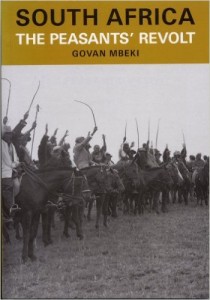Sarah Bruchhausen
The purpose of this article is to demonstrate some of the ways in which rural histories can enhance our understanding of both rural and urban resistance, both past and present, in contemporary South Africa. In order to do so, it explores two books in conversation with each other, Thembela Kepe and Lungisile Ntsebeza’s edited volume Rural Resistance in South Africa: The Mpondo Revolts after Fifty Years as well as Peter Alexander, Thapelo Lekgowa, Botsang Mmope, Luke Sinwell and Bongani Xezwi’s Marikana: A View from the Mountain and a Case to Answer. These two books provide a useful platform from which to engage in a re-examination of rurally based protest and repression in order to locate some of the suggestive links, particularly in regard to the transmission of repertoires of struggle, between the Marikana strike and the Mpondo revolts, as well as the on-going struggles of the organised poor in some of South Africa’s urban centres.
Attachments
Understanding Marikana Through The Mpondo Revolts

